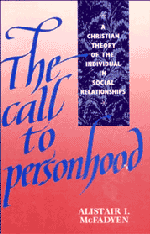9 - Institutions
Published online by Cambridge University Press: 03 May 2011
Summary
The necessity of stable social structures
The discussion in the preceding chapters concerning relations in the socio-political sphere led me to argue that the mark of a true society is openness. If the social codes of a society are genuinely open, then no person and no possible subject of discussion will be excluded from communication on arbitrary or non-rational grounds. As I have already indicated, however, such openness can never be total. To speak of a ‘code’ is already, in fact, to speak of structure and regulation, and therefore of some measure of closure; total openness, on the other hand, would imply a situation of complete indeterminacy, randomness and chaos. The fact that sustainable social life requires structures and institutions to carry the social code further implies that what is required is not so much an unlimited and unrestrained openness, but open institutions or – to phrase it another way – institutionalised openness. The institutions of a true society are to be open in two ways. First, they are to ensure the widest participation of all – both inside and outside the society – in so far as they genuinely have an interest in it.
- Type
- Chapter
- Information
- The Call to PersonhoodA Christian Theory of the Individual in Social Relationships, pp. 231 - 270Publisher: Cambridge University PressPrint publication year: 1990

